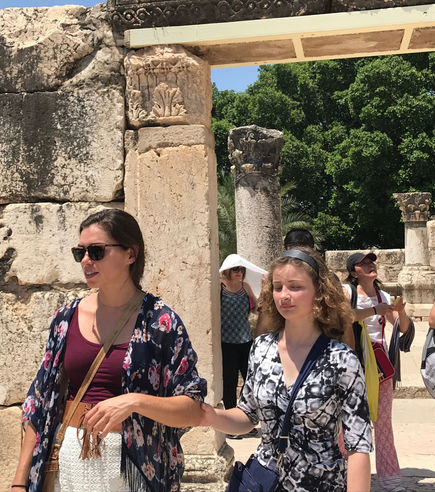
"While at Notre Dame, I had the opportunity to travel abroad four times – all were incredible and enriching experiences. Despite my visual impairment, I love exploring new places and I received unparalleled support from ND to make that passion a reality as an undergrad. From preparing my class materials for the study abroad experiences to translating information about my assistive technology into local languages and arranging sighted guides (my guide dog did not join me), the staff at Sara Bea Accessibility Services and in Study Abroad ensured that I could fully participate in all the opportunities for travel and exploration that ND Global makes available. I am so thankful for the chances I have had to study abroad; for the friends who generously walked with me and described the beauties of our destinations; for the team at ND G,lobal who are committed to “Bringing Notre Dame to the World” (regardless of disability); and for the Sara Bea Accessibility Services, which enabled me to thrive on main campus and abroad." --- Madeline Link '20
The University of Notre Dame is committed to the values of diversity, equity, and inclusion and extends this commitment to those studying abroad. The social and political environments are important considerations for any possible study abroad location. Local perceptions and laws concerning physical mobility, mental illness, and chronic conditions can vary significantly from one location to another, and it is crucial that these factors be explored before you commit to any study abroad program.
Study Abroad has compiled information regarding the selection of programs, questions to ask yourself, and additional resources for you as you consider overseas travel with a disability. We encourage you to contact a Study Abroad program director if you would like to speak with a student who has participated in study abroad or if you would like to discuss your personal questions or concerns.
Selecting a Program
You are likely familiar with what you need to navigate campus and South Bend with your disability and the challenges it presents. Being abroad, however, will likely present different challenges. Prior to application and departure, it will be important to:
Research your destination
Consult with the Sara Bea Accessibility Services and request appropriate accommodations
Verify the legality and availability of any medications you take
If available at your destination, arrange for additional support
Other parts of the world will have different standards of accessibility and attitudes and perceptions of persons with disabilities. The US has laws in place (American with Disabilities Act, ADA) to ensure accessible accommodations. However, your destination likely has other laws and the ADA may not be applicable or enforceable. Be sure to ask or arrange for accommodations as far in advance as possible as it may take an extended period to arrange accommodations in your host country. It is important that you remain flexible and adaptable while traveling.
Questions to Ask Yourself
The following questions and prompts will help you consider your target destinations and what is or may be possible. Schedule an appointment with your advisors and with a Study Abroad program director to discuss any or all of the below items:
- What accommodations do I require to manage my needs?
- How can I access these accommodations (such as a wheelchair, additional time to take tests, counseling appointments, regular blood draws, etc.) while overseas?
- What coping strategies do I use in the US? How will I apply or modify these while I am abroad?
- If I am unable to get the accommodations I need, how can I adapt or create alternative strategies to succeed?
- How does my preferred host country address and perceive physical mobility (ramps, elevators, etc.) and/or invisible or non-apparent disabilities (learning disabilities, ADD/ADHD, anxiety, asthma, etc.)?
- What laws or infrastructure are in place in my preferred destination(s) to help support persons with disabilities?
- Is there a local community of people with similar needs that I could connect with? What type of housing is available in my destination country and will it adequately address my accommodation needs?
- Are there other sources of funding that can provide additional assistance to me?
- Are there any on-campus support resources that I can access from abroad?
- If I am in a wheelchair or some other mobility-assisted device, what is my ability to navigate obstacles in and/or out of the wheelchair or device?
- Should I have concern about the size of my wheelchair in my preferred location(s)?
- How might I go about obtaining repairs for my wheelchair?
Additional Resources
Want to know more? There are a number of organizations beyond ND who help students study abroad. Additional resources for information and preparation include: